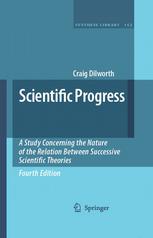

Most ebook files are in PDF format, so you can easily read them using various software such as Foxit Reader or directly on the Google Chrome browser.
Some ebook files are released by publishers in other formats such as .awz, .mobi, .epub, .fb2, etc. You may need to install specific software to read these formats on mobile/PC, such as Calibre.
Please read the tutorial at this link: https://ebookbell.com/faq
We offer FREE conversion to the popular formats you request; however, this may take some time. Therefore, right after payment, please email us, and we will try to provide the service as quickly as possible.
For some exceptional file formats or broken links (if any), please refrain from opening any disputes. Instead, email us first, and we will try to assist within a maximum of 6 hours.
EbookBell Team

4.1
90 reviewsKuhn and Feyerabend formulated the problem. Dilworth provides the solution.
In this highly original and insightful book, Craig Dilworth answers all the questions raised by the incommensurability thesis. Logical empiricism cannot account for theory conflict. Popperianism cannot account for how one theory is a progression beyond another. Dilworth’s Perspectivist conception of science does both.
While remaining within the bounds of classical philosophy of science, Dilworth does away with the logicism of his competitors. On the Perspectivist view theory conflict is not contradiction, and theory superiority does not consist in deductive subsumption or set-theoretic inclusion. Here the relation between theories is analogous to the application of individual concepts, and the question of theory superiority becomes one of relative applicability. In this way Dilworth succeeds in providing a conception of science in which scientific progress is based on both rational and empirical considerations.
"[Dilworth] convincingly works out how from his point of view it is possible to explain the conflict between two theories as an incompatibility of perspectives, and at the same time avoid sliding into relativism by giving criteria for scientific progress." Dialectica